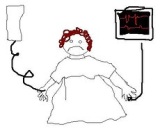November 16th, 2010 by admin in Better Health Network, Opinion, True Stories
1 Comment »

It was a straightforward phone message (names changed): “Hey Dr. S., this is Bobbie Jones, April Dixon’s granddaughter. I was calling to inform you that April passed away today at City Hospital. They said she was bleeding in her stomach or something. I’m not quite what sure what happened, but she got real sick. But she’s gone, so, thanks so much. You’ve been a real neat doctor, and it’s been good working with you through the years taking care of my grandmother. Take care. Bye.”
Bobbie Jones is a saint. Pure and simple. She took care of her 88-year-old grandmother with tender, loving care. I am certain if left to the vagaries of the “healthcare system” that her grandmother would have died at least three years ago, maybe earlier.
Ms. Jones will get no recognition. No income. No honors, save this blog post which she’ll never see. She will get a letter from me, expressing my condolences and appreciation for the love and care that she provided her grandma. She singlehandedly advocated for an octogenarian with advanced dementia and probable cancer (we were never able to get a definitive diagnosis of it) and gave her a quality of life that I would want were I in her grandma’s shoes. Read more »
*This blog post was originally published at ACP Internist*
November 2nd, 2010 by admin in Health Policy, Humor, Opinion, True Stories
No Comments »
This is a guest post from Carolyn Thomas:
 An Open Letter To All Hospital Staff
An Open Letter To All Hospital Staff
Dear hospital employees,
After a particularly bizarre experience undergoing a treadmill stress echocardiogram at your hospital recently, I decided to do something that I have never done before: I called the manager of the cardiology department to complain about her staff. (Incidentally, a recent opinion survey of international tourists found that Canadians were #1 in only one category: “Least likely to complain when things go wrong” — so you can appreciate that lodging an official complaint is a fairly big deal here!)
In my best PR fashion, I told the manager how distressing the appointment had been because of the behaviour of the two cardiac technicians in the room. It’s not so much that they were openly rude, but it was their insufferable lack of people skills that had pushed me over the edge. No introductions, no eye contact, no consideration of how awkward this test can be, no explanation of the test procedures or even the flimsiest effort at polite conversation. To them, I was merely the 1:00 o’clock appointment, the obstacle between them and their next coffee break, just a piece of meat on a slab — but worse, an invisible piece of meat. Read more »
October 24th, 2010 by admin in Better Health Network, True Stories
No Comments »

She’s tweeting her medical mission in Haiti. So tragic are the unmet medical needs of these people. From Doc Gurley:
Saw an alone 9-month-pregnant 19 yr old. No birth kit, no string for the cord, no plan for who would be with her. Gave supplies+discussed how to ask helper to wash hands. Nothing sharp&clean for cord so gave scalpel. Acted out birth, w/handwashing.
Also saw woman with overwhelming postpartum uterus infection. Someone used hands at delivery to pull out pieces of placenta.
Saw 14yrold girl w/months of excruciating pain, mass in her lower belly, wasting. Ruptured appy? Tumor? Left her w/ narcotics, antibiotics.
Also, women do not have menstrual protection supplies:
I’ve been asked, if there are no pads, what do women use? In the cases I saw, one used a page of a magazine & another a dinner napkin.
God bless you, Doc Gurley, and the members of your team for all you’re doing. What can we do to help?
*This blog post was originally published at tbtam*
August 11th, 2010 by admin in Better Health Network, Health Policy, Opinion
No Comments »


By John Henning Schumann, M.D.
The Patient Protection and Affordable Care Act (aka “Health Care Reform”) signed by President Obama in March will revolutionize primary care in the United States. By 2014 tens of millions of uninsured people will “enter” the system by being granted insurance, either through expansion of the Medicaid program or through mandated purchasing of insurance via state pools or the private market.
This alone will have a profound impact, straining the capacity of our already frayed system. Therefore, embedded in the law are funds to encourage growth and improvement in primary care: Incentives to encourage graduates to enter primary care fields (family medicine, internal medicine, and pediatrics) and practice in underserved areas (through scholarships and loan forgiveness), and money to re-format the way that primary care is practiced and paid for. Read more »
*This blog post was originally published at ACP Internist*
November 26th, 2009 by admin in Better Health Network, Quackery Exposed, Research
2 Comments »

By Dr. Amy Tuteur
Waterbirth has been touted as an alternative form of pain relief in childbirth. Indeed, it is often recommended as the method of choice for pain relief in “natural” childbirth. It’s hardly natural, though. In fact, it is completely unnatural. No primates give birth in water, because primates initiate breathing almost immediately after birth and the entire notion of waterbirth was made up only 200 years ago. Not surprisingly, waterbirth appears to increase the risk of neonatal death. Read more »
*This blog post was originally published at Science-Based Medicine*















